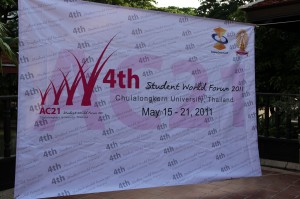Learning about self-reliance and sustainability in Thailand – Lelani Mannetti

In May I was fortunate enough to travel to Thailand to attend the fourth AC21 (Academic Consortium of the 21st Century) Student World Forum (SWF). Under the topic of ‘Sustainable Rural Development’, more than 60 students from across the globe (including Thailand, Japan, China, Laos, USA, Germany, Australia, Indonesia, Moldova and South Africa) came together at Chulalongkorn University in Bangkok to learn about sustainable rural development initiatives in Thailand and to share perspectives from around the world.

From the moment we landed in Bangkok, the Chulalongkorn University (or Chula as it is fondly called) student staff took impeccable care of us, making sure that we were safe, comfortable and enjoying every moment. An ice-breaker was held, in the form of a welcoming reception at the University’s Cultural Centre – Thai House, where we were able to formally meet the other students, and the AC21 Steering Committee. While in Bangkok, we were accommodated in university residence and during our visit to the Phetchaburi Province, we stayed at the Borfai Airforce Resort, this time sharing rooms. Before leaving for the Huay Sai Development Study Centre in Phetchaburi, we attended the Opening Ceremony, and were briefly introduced to the goals of the forum. These were to 1) network, 2) to learn, hands-on, about rural activities; and 3) to discuss perspectives from our home countries.
The entire programme revolved around four focal topics; namely water, soil, forestry and quality of life. Since networking was so high on the agenda, we were grouped with students from a broad spectrum of disciplines (including Sustainability, Agriculture, Ecology, Engineering, the Arts, Media and International Relations). This meant that we were always interacting with different students, with different experiences and at different stages of their academic careers. Despite the differences in age, degrees, majors and nationality (and the soaring temperatures and high humidity) – no one ever seemed to hold back. Needless to say, much time was spent laughing!
This year the SWF was much more practical, and very little time was spent in classrooms. We were briefed about various projects and its context and goals, and then spent the rest of the workshop participating in fieldwork practices and engaging directly with farmers and workers. We observed techniques involved in the use of vetiver grass (Vetiveria sp.) to regenerate compacted and degraded hardpan soil and were able to see how the project has been run and refined over the past two decades. We were shown how various irrigation techniques (including reservoirs, check dams, canals, and wet forest systems) work and how these support local farming and reforestation initiatives. We witnessed how the unique moisture distribution system, employed to revitalise mountain forests, is starting to show visible successes. It is believed that where farmers practice integrated farming systems; they can decrease costs and increase their family income, leading to financial security or ‘sufficiency economy’. Uncle Kin, a local farmer, demonstrated that by practicing various agricultural techniques and producing various goods, you avoid land degradation caused by monoculture, while diversifying your income and avoiding the pitfalls of market fluctuations.
The most intriguing aspect of the forum was to learn directly from my Thai colleagues about the social-political system and the role of the Monarchy, under the rule of His Majesty King Bhumibol Adulyadej, in the initiation of royal development projects.
Various group activities lead to much fun and enlightening experiences, as we got to know each other better, and learn about each other’s countries.
The groups had to present on sustainable resource development, resource use and the technologies involved, on local and global scales, which lead to many stimulating discussions. We were also fortunate enough to be taken shopping and sightseeing, visiting King Rama IV vacation palace, having dinner on a river cruise ship as well as visiting the Grand Palace and Museum of Siam. Most importantly, we all ended up as friends, and the goals of the forum, which were to network, learn and share experiences, were successfully met. We all acknowledge that the experience would not have been as extraordinary were it not for the omnipresent smiles, unlimited generosity and cordial hospitality of the Chula staff and the Thai people in general, and without the zeal of all the participants to learn and forge new friendships.